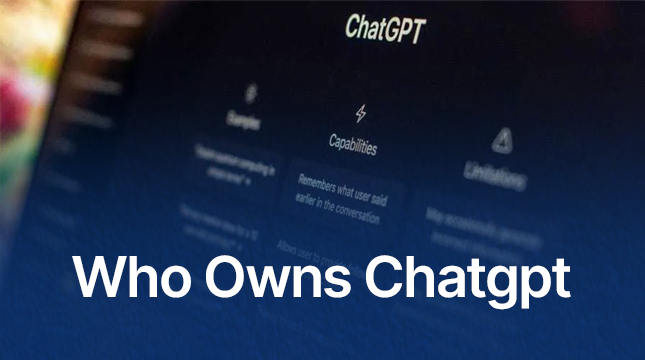This website uses cookies so that we can provide you with the best user experience possible. Cookie information is stored in your browser and performs functions such as recognising you when you return to our website and helping our team to understand which sections of the website you find most interesting and useful.
Who Owns ChatGPT?

Introduction
ChatGPT has rapidly become a household name in the realm of artificial intelligence. Whether you’re using it for writing assistance, answering queries, or even just having a friendly chat, it’s fascinating to think about who stands behind this revolutionary tool. Understanding the ownership and the driving forces behind ChatGPT can give us better insight into its development, ethical guidelines, and future prospects.
Read More : ChatGPT Image Generator
The Origins of ChatGPT
ChatGPT is a product of continuous innovation and development in the field of AI. Its journey began as an ambitious project aimed at creating a highly advanced language model capable of understanding and generating human-like text. The initial goals were to enhance natural language processing and create a tool that could assist with various tasks, from answering questions to generating creative content.
Read More : Chatgpt 4o
OpenAI: The Creator of ChatGPT
ChatGPT is developed by OpenAI, a leading AI research organization. OpenAI was founded in December 2015 by Elon Musk, Sam Altman, Greg Brockman, Ilya Sutskever, John Schulman, and Wojciech Zaremba, among others. The organization was established with the vision of ensuring that artificial general intelligence (AGI) benefits all of humanity. They aimed to conduct cutting-edge research while being transparent about their progress and findings.
Read More : How to Cite ChatGPT: A Complete Guide
The Mission of OpenAI
OpenAI’s mission is to ensure that artificial intelligence serves as a benefit to all of humanity. This mission is reflected in their work on ChatGPT, which aims to make advanced AI accessible and beneficial to a broad audience. OpenAI believes in developing AI technologies that can be used responsibly and ethically, ensuring that their benefits are widely distributed.
Key People Behind ChatGPT
Several key individuals have played significant roles in the development of ChatGPT. Elon Musk and Sam Altman are among the most notable figures associated with OpenAI’s founding. Today, the leadership includes Sam Altman as the CEO and Greg Brockman as the CTO. The contributions of numerous researchers, engineers, and ethicists are also crucial to the ongoing development and improvement of ChatGPT.
OpenAI’s Evolution Over Time
Since its inception, OpenAI has undergone several transformations. Initially, it started as a non-profit organization but later restructured to include a for-profit arm known as OpenAI LP. This change allowed OpenAI to attract more funding and accelerate its research and development efforts. Key milestones include the release of GPT-2, GPT-3, and now GPT-4, each representing significant advancements in AI capabilities.
Funding and Investment
OpenAI’s journey has been supported by significant funding from various sources. Early funding came from prominent figures like Elon Musk and Sam Altman. Over time, the organization attracted investments from other tech leaders and venture capitalists. One of the most significant investments came from Microsoft, which has partnered with OpenAI to provide the computing power necessary for training large AI models.
Microsoft’s Role
Microsoft’s partnership with OpenAI is pivotal. Through this collaboration, OpenAI gained access to Microsoft’s Azure cloud platform, which provides the computational resources needed for training and deploying large-scale AI models. In return, Microsoft integrates OpenAI’s technologies into its products and services, enhancing their AI capabilities.
Ownership Structure
OpenAI operates with a unique structure, comprising a non-profit organization (OpenAI Inc.) and a for-profit subsidiary (OpenAI LP). This structure is designed to balance the need for funding with the organization’s ethical commitments. OpenAI Inc. holds a controlling interest in OpenAI LP, ensuring that the non-profit’s mission and values guide the for-profit’s activities.
Ethical Considerations
Ethics are at the core of OpenAI’s work. The organization is committed to developing AI that is safe, fair, and aligned with human values. OpenAI has implemented strict policies and guidelines to govern the development and deployment of its technologies. These include measures to prevent misuse and ensure transparency in AI research and applications.
Commercialization of ChatGPT
To sustain its research efforts, OpenAI has introduced several revenue-generating strategies. ChatGPT is available through subscription models like ChatGPT Plus, which offers enhanced capabilities for a monthly fee. These commercial offerings help fund ongoing research and development while making advanced AI accessible to a wider audience.
Community and Developer Engagement
OpenAI actively engages with the developer community. By providing APIs and open-source tools, they enable developers to integrate ChatGPT into their applications. This collaborative approach helps drive innovation and allows the broader community to contribute to the model’s improvement and expansion.
Public Perception and Impact
ChatGPT has been well-received by the public and has had a significant impact across various industries. From customer service to content creation, its applications are diverse and far-reaching. The public generally views ChatGPT as a useful and innovative tool, though there are ongoing discussions about its ethical implications and potential risks.
Challenges and Controversies
Like any groundbreaking technology, ChatGPT and OpenAI have faced their share of challenges and controversies. Concerns about data privacy, ethical use, and the potential for AI to replace human jobs are prevalent. OpenAI addresses these issues through transparent communication and by implementing robust ethical guidelines.
Future Prospects
Looking ahead, OpenAI has ambitious plans for ChatGPT. Future developments may include enhanced contextual understanding, more personalized interactions, and broader integration into everyday applications. OpenAI’s long-term vision remains focused on ensuring that AI technologies are safe, ethical, and beneficial for all.
Conclusion
Understanding who owns ChatGPT provides insight into its development, ethical considerations, and future trajectory. OpenAI, with its unique structure and mission-driven approach, plays a pivotal role in shaping the future of AI. As ChatGPT continues to evolve, its ownership and guiding principles will remain crucial in determining its impact on society.

Let's Start Your Project
Get free consultation for your digital product idea to turn it into reality!
Get Started





